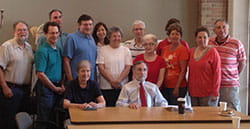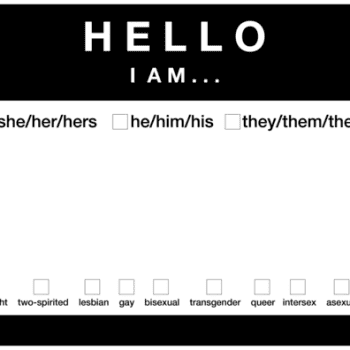For instance, the first line in the Book of Mormon: "I, Nephi, having been born of goodly parents." When I read it this Torah-way, it seemed to invite me to inject myself into Nephi's story. Its use of first-person pronouns connected me instantly to him psychologically as well as grammatically and prepared me to walk with Nephi, imaginatively, as he journeyed to the Promised Land. I may not agree with every choice Nephi made, but I was there with him as "I, Nephi" attempted to deal with his family's sudden departure (1 Ne. 2:16), as "I, Nephi" declared his willingness to return with his brothers to Jerusalem for the brass plates (3:7), as "I, Nephi" puzzled over what to do after their initial attempts to obtain the brass plates failed (4:5), and as "I, Nephi" struggled to determine what to do with the drunk Laban who lay in front of him (4:14). His days became my days, and I understood better what immersing myself in the words of scripture was all about.
Lesson Two: Read aloud
Torah class also showed me the value of reading scripture out loud. After reciting the blessing with the class, Rabbi Friedman does not deliver a lecture or present a sermonette for the class to consider. Instead he goes immediately to the text and asks a member of the class to read the next verse aloud, first in Hebrew and then in English. Not everyone in the class can read Hebrew, and only a few can read it fluently. Many stumble (including myself) as they sound out, syllable by syllable, new or unfamiliar words. Such an approach may seem inefficient or even tedious. However, hearing the words of the Torah read slowly, deliberately, sometimes even haltingly, serves to focus our attention firmly on the sounds of the Torah and in so doing opens us up to new insights.
During one session, a sofer, or scribe, was invited to discuss his perspective on the Torah. He brought in a scroll he was repairing, unrolled it over several long tables, and had us scrutinize it up close. To him, everything about this scroll had a divine significance: the parchment, the stitches, the margins, but especially the words. He asked us to pay particular attention to the name of God (YHWH, as it is transcribed into English). He then asked us to pronounce the letters of this name, not the name itself, just the letters. We did so, and he then asked us what those letters sounded like. No one responded. After a few seconds of silence, the sofer suggested that what we had heard was the voice of God — a whisper, a sigh, a quiet plea from Sinai, carried on a desert wind, calling to his scattered children. It was a mystical moment.
As I reread Nephi's first verse out loud, I found its sounds similarly transporting. There clause follows hard upon clause, twisting and turning through awkward conjunctions and sudden pauses — all grammatically correct but forming a sentence too long and complicated to be read aloud without necessitating several breaths — and in them I heard the sounds of Nephi's journey, a trip full of effort and pain and difficulty, a trek that went on much longer than Nephi had expected but had nevertheless led him to profound discoveries, treasures too wondrous and valuable to keep to himself. And I found myself eager to travel with him into his wilderness and learn all that it had to teach me.
 Lesson Three: Read carefully
Lesson Three: Read carefully
Torah class taught me to read scripture carefully and to contemplate not only the significance of every word but to consider the presentation of that word. Since the Torah reading includes Hebrew as well as English, class members often ask about the accuracy of the translation we use and suggest additional interpretations of key Hebrew words. They also notice how words appear in sentences, what verbal patterns they make (and break), as well as how they may resonate with other passages of scripture. For instance, after reading Leviticus 19:3, one class member asked why this verse instructed the ancient Israelites to fear their parents, while in Exodus 20:12 they were commanded to honor them.
As a Reform Jew, Rabbi Friedman is not committed to the divine authorship of the entire Torah and therefore frequently explains differences in Pentateuchal wording as evidence of different human sources. But not always. This time he saw great significance not only in the different words used with regard to the attitude children should have toward their parents but in the fact that in Leviticus mothers are mentioned first while fathers come first in Exodus. As he explained, fathers are often feared but not always honored while mothers are often honored but not always feared. These two verses therefore balance out these different attitudes and promote a healthier, more complete approach to one's parents.




